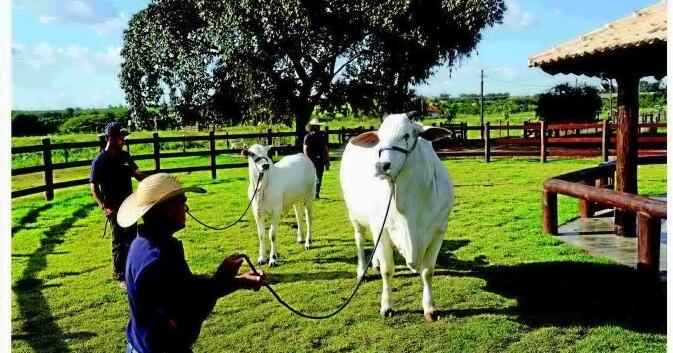UBERABA, Brazil — Brazil boasts hundreds of millions of cows, but one stands out. Watched over by security cameras and an armed guard, Viatina-19 FIV Mara Movéis is an extraordinary cow with a massive, snow-white body.
Sold for $4 million at auction, Viatina-19 is the most expensive cow ever, according to Guinness World Records. She weighs over 2,400 pounds, twice the weight of an average cow of her breed.
Located along a highway in Brazil, Viatina-19’s owners have erected billboards celebrating her grandeur and inviting people to visit the supercow.
Despite the push from climate scientists to reduce beef consumption due to its environmental impact, Brazil’s cattle industry remains crucial for economic development. The country aims to expand its export markets and become the top beef exporter globally.
People are also reading…
At the forefront of Brazil’s cattle ambitions is Viatina-19, the result of years of breeding efforts to produce robust cows. High-stakes auctions sell prize-winning cows like her for exorbitant prices, showcasing the elite genetics that ranchers aspire to replicate.
Valued for her rapid muscle growth, fertility, and genetic traits passed down to her offspring, Viatina-19 embodies perfection in the eyes of breeders. With a price tag of $4 million, she represents the peak of cattle breeding achievement.
While the majority of Brazil’s cows belong to the Nelore breed, known for its meat production, efforts to enhance genetics and produce superior cattle continue. Events like ExpoZebu in Uberaba showcase the best of Brazil’s cattle genetics, with cows like Viatina-19 commanding record prices.
Despite the environmental impact of cattle farming, genetic improvements and sustainable practices offer hope for a more eco-friendly industry. Brazil’s push to expand its beef exports highlights the country’s ambition to become a dominant player in the global market.
President Lula da Silva’s efforts to open new markets and promote Brazilian beef demonstrate the country’s commitment to growing its agricultural sector. With ongoing advancements in cattle genetics and breeding technologies, Brazil aims to solidify its position as a key player in the global beef industry.
As the demand for premium beef rises, innovative practices like cloning and genetic enhancements pave the way for a more efficient and sustainable cattle industry. While cows like Viatina-19 may not be suitable for large-scale production due to their high maintenance needs, they represent the pinnacle of breeding excellence in Brazil.





